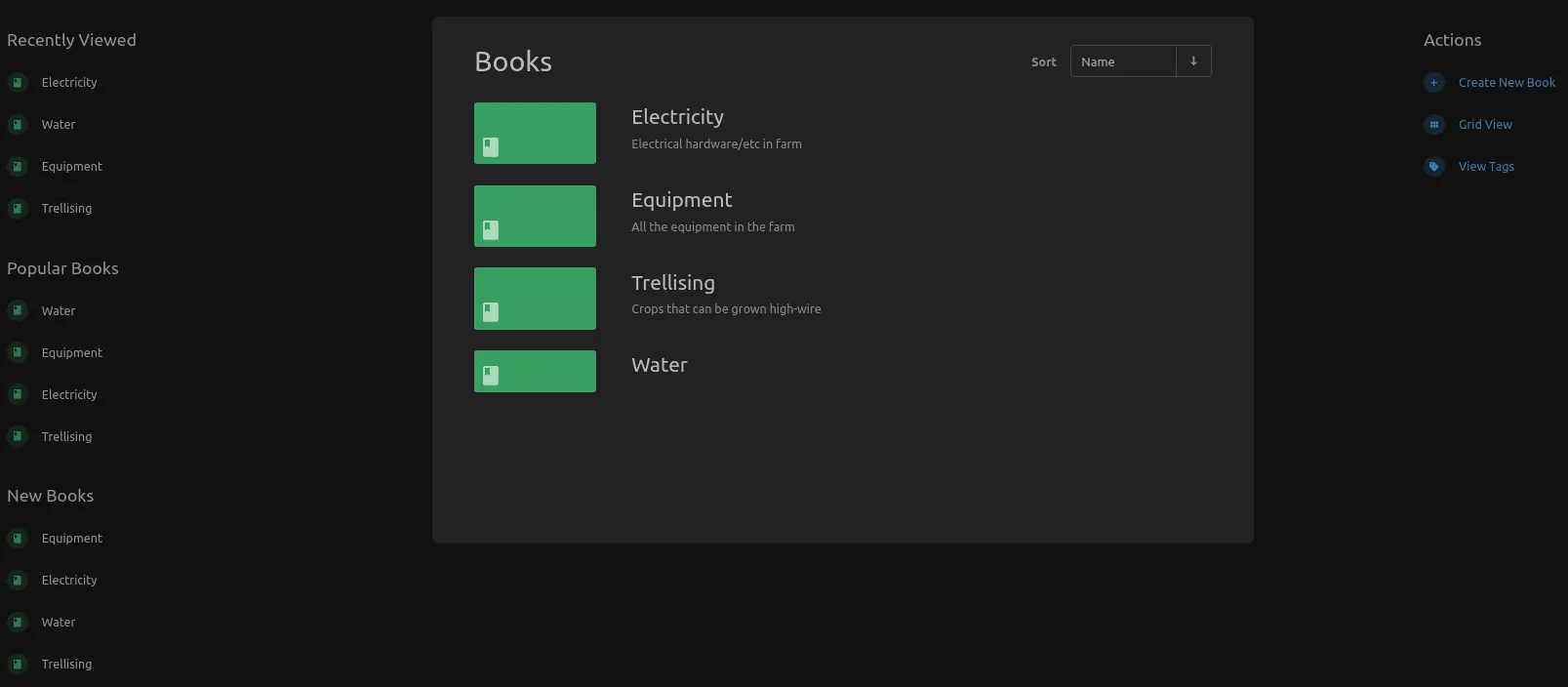I have a bookstack instance self-hosted and I quick like the program and workflow. I like having ‘books’ of information to separate/organize my information. It feels very much like folder heirarchy to me, and while that has its issues, I prefer it. Being able to add tags to pages helps alleviate some of those issues and helps with a broad search for an idea when I don’t know where it is stored down the line. Here is a quick view of my bookstack. It’s nothing fancy, but a visual to see what I’m talking about.

It’s great software. But I am very fond of software designed to be readable in 100 years. Meaning that the file does not require the program to be read. Text files (.txt, .rtf, .odt) are formats that are designed to be read in the future without MS Word, or Notepad; .doc, .docx, etc without microsoft might not be readable in 100 years without having MS software. That is why I like taking notes with markdown and why I like software like QownNotes, obsidian, and logsec which produce files that are readable without the program. So if they crash and burn, I don’t lose my data. With Bookstack, I cannot view that data without bookstack. And if I wanted to move my documents to a different software, I cannot export everything. I can export page-by-page but that’s only reasonble on a small scale. So, while I like the program, I would like to move to another program for my wiki/personal knowledge base.
For those wondering why I am worried about this: I’ve run into many walls with software problems in my life:
- software I use being abandoned
- new terms of service I don not agree with blocking me from using the program I like
- price hikes for software I use that are not worth it but I’m vendor locked and so I have to either pay or go the tedious route of moving my data slowly over because there is no export possibilities. 4)I am using a new device and I can’t access or view my data because the software doesn’t work on the device, hasn’t been ported over, or isn’t usable on the novel form factor of the device.
My worries with bookstack flow from there. It may be a good program, but what if my needs change, can I move my data easily?
In my search, Tiddlywiki was a standout in this view because it is a quine. It contains all its code to run/display itself (it’s a quine). So in 100 years, you should be able to open a tiddlywiki and it will contain be able to be read. However, I am having a hard time adapting to tiddlywiki’s way of doing things. Far less user friendly than Bookstack in ease of use. Thus I am writing this post to see if anyone else has ideas. Is there a way to make tiddlywiki look/work more like Bookstack in the book→pages (or folder→files) workflow? Or do you know of another piece of software for a knowledge base that meets the ideas above?


Probably not exactly what you’re looking for, but for my personal use I just set up a repo in my git forge (gitea in my case) with a bunch of markdown files in various folders and a Hugo theme.
Every time I want to update a document I can click the link at the bottom of the “Wiki” page and edit it in Gitea’s WYSIWYG editor. Similar process if I want to make a new document. When I save the changes I have a CI job (native to Gitea/Github) that uses Hugo to build the markdown docs into a full website and sync it to a folder on one of my servers where it’s picked up by a web server.
Sounds complicated when I type it all out, but the only thing that I can reasonably expect to be a deal breaker is the Hugo software, of which there are archived versions, and even if there wasn’t Hugo’s input is just markdown, so I can repurpose however I see fit.
You could probably do something similar with other SSG’s or even use Github’s pages feature, though that does add a failure point if/when they decide to sunset or monetize the feature.